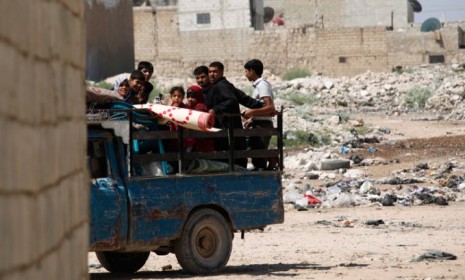Is it time to recognize a provisional government in Syria?
France's president, Francois Hollande, wants Syrian rebels to merge under one banner to present a united front against President Bashar al-Assad's regime

A free daily email with the biggest news stories of the day – and the best features from TheWeek.com
You are now subscribed
Your newsletter sign-up was successful
French President Francois Hollande is urging Syrian opposition groups to band together and form a provisional government, saying it's the best way to bring the country's deadly 18-month conflict to an end. Civilians are facing some of the fiercest attacks yet by government fighter planes on the outskirts of Damascus, and rising numbers of refugees are trying to escape the violence by fleeing to neighboring Turkey. Hollande said Monday that giving the international community a credible alternative government to rally behind would ratchet up pressure on Syrian President Bashar al-Assad to leave. Would it really help stop the fighting? A closer look at the proposal:
What does Hollande want rebels to do?
He's asking the fractured opposition to set aside its differences and unify under a single "inclusive and representative" leadership that could "become the legitimate representative of the new Syria." Hollande says the Arab League is helping by trying to get opposition factions to agree to one transition plan for a post-Assad Syria, and he promises that France will recognize the provisional government as soon as it's formed.
The Week
Escape your echo chamber. Get the facts behind the news, plus analysis from multiple perspectives.

Sign up for The Week's Free Newsletters
From our morning news briefing to a weekly Good News Newsletter, get the best of The Week delivered directly to your inbox.
From our morning news briefing to a weekly Good News Newsletter, get the best of The Week delivered directly to your inbox.
Could that make a difference?
It did in Libya. France was one of the first governments to recognize the Transitional National Council as the legitimate government of Libya last year, and that group spearheaded the overthrow of longtime dictator Moammar Gadhafi. The U.S. typically doesn't recognize new governments before the old one collapses, although it made an exception in Libya. The trouble is, Syria's opposition groups are even more divided than Libya's. The main exile group, the Syrian National Council (SNC), has resisted joining forces with internal opposition groups, says Julian Borger at Britain's Guardian, "fearing a dilution of its influence."
Is the SNC the key to making this work?
Hollande might think so — France is a big backer of the exile group — but the U.S. and the U.K. have other ideas, Borger says. They're distancing themselves from the SNC, and building closer ties with the opposition within Syria. Abdelbaset Sieda, the leader of the SNC, has said his group is making plans for a transitional government, but several other rebel factions, including a new one headed by veteran opposition leader Haitham Maleh, are making similar plans on their own. It would be great to bring everyone in the opposition under one umbrella, one U.S. official tells The Guardian, but "we're nowhere near that yet."
A free daily email with the biggest news stories of the day – and the best features from TheWeek.com
What can foreign powers do in the meantime?
Unless Syria uses chemical weapons — which Hollande, like President Obama, warned would force international intervention — Hollande said France and other countries are mostly trying to set up "buffer zones" proposed by Turkey to protect refugees as they make their way to the border. France's defense minister, Jean-Yves Le Drian, has said that could involve "no-fly zones" over Syria from the besieged city of Aleppo to the Turkish border, an idea he credited to U.S. Secretary of State Hillary Clinton. But France acknowledged that all of these measures will be hard to implement as long as Russia and China use their vetoes at the United Nations Security Council to protect Assad.
Sources: The Associated Press, Foreign Policy, The Guardian, The New York Times
-
 Local elections 2026: where are they and who is expected to win?
Local elections 2026: where are they and who is expected to win?The Explainer Labour is braced for heavy losses and U-turn on postponing some council elections hasn’t helped the party’s prospects
-
 6 of the world’s most accessible destinations
6 of the world’s most accessible destinationsThe Week Recommends Experience all of Berlin, Singapore and Sydney
-
 How the FCC’s ‘equal time’ rule works
How the FCC’s ‘equal time’ rule worksIn the Spotlight The law is at the heart of the Colbert-CBS conflict